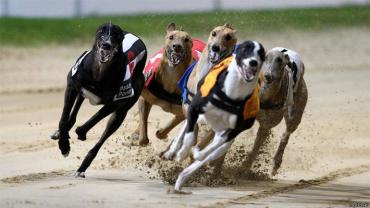
A bill to ban anabolic steroids in Florida greyhound racing is one step closer to becoming law in the Sunshine State. On Wednesday, the House subcommittee on Tourism and Gaming passed HB 463 after a lengthy debate over the safety and humane treatment of greyhounds in the racing industry.
HB 463, sponsored by Reps. Carlos Smith, D-Orlando, and Randy Fine, R-Brevard County, would ban anabolic steroids from greyhounds. Smith proposed a similar bill during last year’s legislative session, but the legislation died in the Senate and did not become law.
Smith’s bill would have widespread effects on the greyhound racing industry, which has been plagued by a variety of drug abuses, including steroids, in order to make dogs larger, faster and ramp up recovery times so dogs can ultimately become more profitable.
Steroids are considered the easiest, cheapest way many human athletes try to improve their performances, but dogs too have become users of the drugs.
“It is a violation of this section for a greyhound to have anabolic steroids present resulting in a positive test for such steroids based on samples taken from the greyhound before or immediately after the race of that greyhound,” the bill reads.
If an individual is found violating the ban, they would be subjected to a $10,000 minimum penalty and could have their racing licenses or permits suspended or revoked entirely.
The legislation raises the question of how dogs are treated in an industry which highly values profits on the backs -- and legs -- of 80-pound dogs.
Smith told the committee Wednesday he didn’t understand why greyhounds were held to different standards than people and human athletes, who are routinely penalized and banned from sports for using anabolic steroids and performance-enhancing drugs.
“It has a similar effect on humans that it does on dogs,” said Smith on steroid use. “They [steroids] are inappropriate for dog racing.”
Anabolic and androgenic steroids are considered a Class 3 foreign substance, and while the drugs are illegal, drug abuse has been found in racing dogs, some of which even tested positive for traces of cocaine.
While some organizations like Grey2K came out in support of the measure, other groups weren’t convinced.
The Florida Greyhound Association was particularly vocal about how it believes the legislation is misleading and provides misinformation about an industry which employs 3,000 people statewide. The group said they did not agree the drugs were performance enhancing and instead insinuated lawmakers were trying to end the practice of greyhound racing altogether.
“[The bill] would create chaos in the kennels. The bill has nothing to do with animal welfare. It has nothing to do with animal rights,” said Florida Greyhound Association lobbyist Jack Cory. “It has to do with destroying greyhound racing, period.”
Smith and Fine said they did not intend to end greyhound racing, which is still legal in the U.S. though its popularity has waned over the years.
"We have to look out for the best interest of these racing athletes and I think the best interest of them is to take away the use of these drugs," Fine said.
Florida, Smith explained, would become a model for other states if legislators passed the ban.
“I think what will happen is that the dogs will be safely and as humanely as possible while greyhound racing still exists,” Smith said. “We as a state have a moral obligation to set the gold standard for how we are going to be treating these dogs fairly and humanely. The rest will follow.”
Sen. Dana Young, R-Tampa, has filed an identical measure in the Senate.
Reach reporter Allison Nielsen by email at allison@sunshinestatenews.com or follow her on Twitter: @AllisonNielsen.


